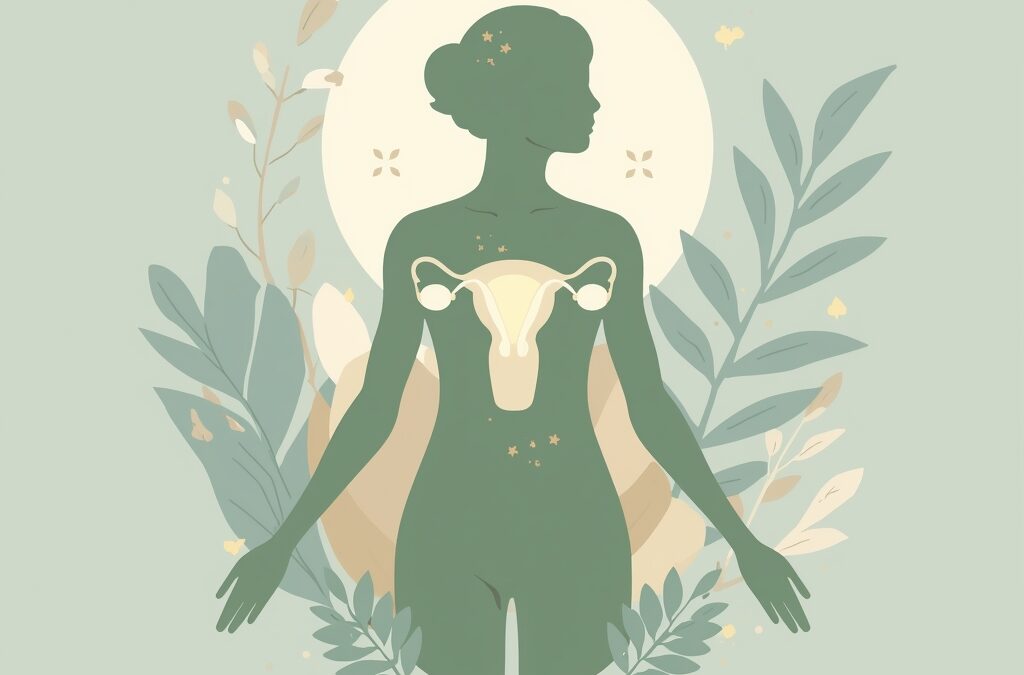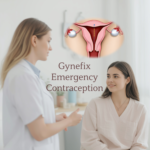– CIN 1 (low grade) — mild changes, often clear naturally.
– CIN 2 (moderate grade) — more significant changes; may regress or progress.
– CIN 3 (high grade) — severe changes, with a higher risk of becoming cancer if untreated.
CIN 1: Mild Cervical Cell Changes
– CIN 1 is usually caused by a persistent HPV infection.
– In most cases, the body’s immune system clears the virus within two years, and the abnormal cells return to normal.
– NHS guidelines recommend monitoring CIN 1 with repeat smears or colposcopy, rather than immediate treatment.
At Holistic Gynaecology Clinic London, we focus on strengthening the immune system and lifestyle factors to support natural healing at this stage.
CIN 2: Moderate Cervical Cell Changes
– CIN 2 can go in two directions: it may regress like CIN 1, or it may progress to CIN 3.
– UK practice allows for conservative (non-surgical) management in selected cases, particularly in younger women. This involves repeat colposcopy, biopsy and HPV testing every 6 months.
– If CIN 2 persists or worsens, standard treatment such as LLETZ is common recommended.
We work with women who choose holistic and conservative management, focusing on immune support, nutrition, lifestyle, and stress reduction alongside close medical monitoring.
CIN 3: Severe Cervical Cell Changes
– CIN 3 is considered a high-grade abnormality and carries a greater risk of progression to cervical cancer if left untreated.
– Because of this risk, the NHS recommends treatment with excisional procedures (such as LLETZ or cone biopsy).
– Holistic approaches alone are not suitable for CIN 3.
Holistic Support for HPV and Abnormal Cervical Cells
At Holistic Gynaecology Clinic London, we take an integrative approach:
1.- Immune System Support
– Nutrition rich in antioxidants, vitamin D, zinc and folate
– Stress management, yoga and meditation
– Regular physical activity
– Stopping smoking (smoking reduces HPV clearance)
2.- Holistic Therapies
– Safe, tailored supplements (under medical guidance)
– Botanical and lifestyle strategies to support natural healing
3.- Monitoring & Collaboration
– Regular colposcopy and smear follow-up
– Referral to NHS or specialist gynaecology services if progression is seen
Cervical Screening: The Key to Prevention
At Holistic Gynaecology Clinic London we offer cervical screening programme (smear test):
– Offered to women and people with a cervix aged 25–64
– Detects HPV and abnormal cervical cells early
– Prevents most cases of cervical cancer when followed up appropriately
If your results show HPV or abnormal cells, it does not mean you have cancer. It means further monitoring or treatment may be needed.
Summary
– HPV is common, and in many cases harmless.
– CIN 1 and CIN 2 can often be managed with monitoring and holistic support.
– CIN 3 requires medical treatment to prevent cervical cancer.
– Holistic care plays an important role in supporting immunity, lifestyle, and overall well-being throughout the process.
– At Holistic Gynaecology Clinic London, we help women navigate HPV and cervical screening results with an integrative, supportive approach.
Bibliography
– NHS — Cervical screening (smear tests)
– Cancer Research UK — Treatment for abnormal cervical cells
– NHS — HPV information (Cambridge University Hospitals)
– UK Government — Colposcopy management and treatment
– Hull University Teaching Hospitals NHS — Conservative management of CIN 2
– Cancer Research UK — HPV and cervical screening results
[/et_pb_text][/et_pb_column][/et_pb_row][/et_pb_section]This article explains what HPV is, how it causes cervical cell changes, and the difference between CIN 1, CIN 2 and CIN 3.What is HPV and How Does It Affect the Cervix?
Human Papillomavirus (HPV) is a common virus transmitted mainly through sexual contact. Most people will have HPV at some point, and in many cases, the infection clears naturally without causing problems.
However, some high-risk HPV strains can remain in the cervix and trigger abnormal cell changes. These changes are detected during cervical screening (smear tests) and confirmed by colposcopy or biopsy.
Understanding CIN: Cervical Intraepithelial Neoplasia
CIN describes the grade of abnormal cervical cells:
– CIN 1 (low grade) — mild changes, often clear naturally.
– CIN 2 (moderate grade) — more significant changes; may regress or progress.
– CIN 3 (high grade) — severe changes, with a higher risk of becoming cancer if untreated.
CIN 1: Mild Cervical Cell Changes
– CIN 1 is usually caused by a persistent HPV infection.
– In most cases, the body’s immune system clears the virus within two years, and the abnormal cells return to normal.
– NHS guidelines recommend monitoring CIN 1 with repeat smears or colposcopy, rather than immediate treatment.
At Holistic Gynaecology Clinic London, we focus on strengthening the immune system and lifestyle factors to support natural healing at this stage.
CIN 2: Moderate Cervical Cell Changes
– CIN 2 can go in two directions: it may regress like CIN 1, or it may progress to CIN 3.
– UK practice allows for conservative (non-surgical) management in selected cases, particularly in younger women. This involves repeat colposcopy, biopsy and HPV testing every 6 months.
– If CIN 2 persists or worsens, standard treatment such as LLETZ is common recommended.
We work with women who choose holistic and conservative management, focusing on immune support, nutrition, lifestyle, and stress reduction alongside close medical monitoring.
CIN 3: Severe Cervical Cell Changes
– CIN 3 is considered a high-grade abnormality and carries a greater risk of progression to cervical cancer if left untreated.
– Because of this risk, the NHS recommends treatment with excisional procedures (such as LLETZ or cone biopsy).
– Holistic approaches alone are not suitable for CIN 3.
Holistic Support for HPV and Abnormal Cervical Cells
At Holistic Gynaecology Clinic London, we take an integrative approach:
1.- Immune System Support
– Nutrition rich in antioxidants, vitamin D, zinc and folate
– Stress management, yoga and meditation
– Regular physical activity
– Stopping smoking (smoking reduces HPV clearance)
2.- Holistic Therapies
– Safe, tailored supplements (under medical guidance)
– Botanical and lifestyle strategies to support natural healing
3.- Monitoring & Collaboration
– Regular colposcopy and smear follow-up
– Referral to NHS or specialist gynaecology services if progression is seen
Cervical Screening: The Key to Prevention
At Holistic Gynaecology Clinic London we offer cervical screening programme (smear test):
– Offered to women and people with a cervix aged 25–64
– Detects HPV and abnormal cervical cells early
– Prevents most cases of cervical cancer when followed up appropriately
If your results show HPV or abnormal cells, it does not mean you have cancer. It means further monitoring or treatment may be needed.
Summary
– HPV is common, and in many cases harmless.
– CIN 1 and CIN 2 can often be managed with monitoring and holistic support.
– CIN 3 requires medical treatment to prevent cervical cancer.
– Holistic care plays an important role in supporting immunity, lifestyle, and overall well-being throughout the process.
– At Holistic Gynaecology Clinic London, we help women navigate HPV and cervical screening results with an integrative, supportive approach.
Bibliography
– NHS — Cervical screening (smear tests)
– Cancer Research UK — Treatment for abnormal cervical cells
– NHS — HPV information (Cambridge University Hospitals)
– UK Government — Colposcopy management and treatment
– Hull University Teaching Hospitals NHS — Conservative management of CIN 2
– Cancer Research UK — HPV and cervical screening results
[/et_pb_text][/et_pb_column][/et_pb_row][/et_pb_section]At Holistic Gynaecology Clinic London, we support women in managing HPV-related changes holistically when appropriate—especially for CIN 1 and CIN 2—while ensuring safe referral for treatment if changes progress to CIN 3, which requires standard medical procedures.This article explains what HPV is, how it causes cervical cell changes, and the difference between CIN 1, CIN 2 and CIN 3.
What is HPV and How Does It Affect the Cervix?
Human Papillomavirus (HPV) is a common virus transmitted mainly through sexual contact. Most people will have HPV at some point, and in many cases, the infection clears naturally without causing problems.
However, some high-risk HPV strains can remain in the cervix and trigger abnormal cell changes. These changes are detected during cervical screening (smear tests) and confirmed by colposcopy or biopsy.
Understanding CIN: Cervical Intraepithelial Neoplasia
CIN describes the grade of abnormal cervical cells:
– CIN 1 (low grade) — mild changes, often clear naturally.
– CIN 2 (moderate grade) — more significant changes; may regress or progress.
– CIN 3 (high grade) — severe changes, with a higher risk of becoming cancer if untreated.
CIN 1: Mild Cervical Cell Changes
– CIN 1 is usually caused by a persistent HPV infection.
– In most cases, the body’s immune system clears the virus within two years, and the abnormal cells return to normal.
– NHS guidelines recommend monitoring CIN 1 with repeat smears or colposcopy, rather than immediate treatment.
At Holistic Gynaecology Clinic London, we focus on strengthening the immune system and lifestyle factors to support natural healing at this stage.
CIN 2: Moderate Cervical Cell Changes
– CIN 2 can go in two directions: it may regress like CIN 1, or it may progress to CIN 3.
– UK practice allows for conservative (non-surgical) management in selected cases, particularly in younger women. This involves repeat colposcopy, biopsy and HPV testing every 6 months.
– If CIN 2 persists or worsens, standard treatment such as LLETZ is common recommended.
We work with women who choose holistic and conservative management, focusing on immune support, nutrition, lifestyle, and stress reduction alongside close medical monitoring.
CIN 3: Severe Cervical Cell Changes
– CIN 3 is considered a high-grade abnormality and carries a greater risk of progression to cervical cancer if left untreated.
– Because of this risk, the NHS recommends treatment with excisional procedures (such as LLETZ or cone biopsy).
– Holistic approaches alone are not suitable for CIN 3.
Holistic Support for HPV and Abnormal Cervical Cells
At Holistic Gynaecology Clinic London, we take an integrative approach:
1.- Immune System Support
– Nutrition rich in antioxidants, vitamin D, zinc and folate
– Stress management, yoga and meditation
– Regular physical activity
– Stopping smoking (smoking reduces HPV clearance)
2.- Holistic Therapies
– Safe, tailored supplements (under medical guidance)
– Botanical and lifestyle strategies to support natural healing
3.- Monitoring & Collaboration
– Regular colposcopy and smear follow-up
– Referral to NHS or specialist gynaecology services if progression is seen
Cervical Screening: The Key to Prevention
At Holistic Gynaecology Clinic London we offer cervical screening programme (smear test):
– Offered to women and people with a cervix aged 25–64
– Detects HPV and abnormal cervical cells early
– Prevents most cases of cervical cancer when followed up appropriately
If your results show HPV or abnormal cells, it does not mean you have cancer. It means further monitoring or treatment may be needed.
Summary
– HPV is common, and in many cases harmless.
– CIN 1 and CIN 2 can often be managed with monitoring and holistic support.
– CIN 3 requires medical treatment to prevent cervical cancer.
– Holistic care plays an important role in supporting immunity, lifestyle, and overall well-being throughout the process.
– At Holistic Gynaecology Clinic London, we help women navigate HPV and cervical screening results with an integrative, supportive approach.
Bibliography
– NHS — Cervical screening (smear tests)
– Cancer Research UK — Treatment for abnormal cervical cells
– NHS — HPV information (Cambridge University Hospitals)
– UK Government — Colposcopy management and treatment
– Hull University Teaching Hospitals NHS — Conservative management of CIN 2
– Cancer Research UK — HPV and cervical screening results
[/et_pb_text][/et_pb_column][/et_pb_row][/et_pb_section]If you’ve recently had a cervical screening (smear test) result showing HPV or abnormal cervical cells, you may feel worried about what this means. Abnormal cells are often classified as Cervical Intraepithelial Neoplasia (CIN), graded as CIN 1, CIN 2 or CIN 3.At Holistic Gynaecology Clinic London, we support women in managing HPV-related changes holistically when appropriate—especially for CIN 1 and CIN 2—while ensuring safe referral for treatment if changes progress to CIN 3, which requires standard medical procedures.
This article explains what HPV is, how it causes cervical cell changes, and the difference between CIN 1, CIN 2 and CIN 3.
What is HPV and How Does It Affect the Cervix?
Human Papillomavirus (HPV) is a common virus transmitted mainly through sexual contact. Most people will have HPV at some point, and in many cases, the infection clears naturally without causing problems.
However, some high-risk HPV strains can remain in the cervix and trigger abnormal cell changes. These changes are detected during cervical screening (smear tests) and confirmed by colposcopy or biopsy.
Understanding CIN: Cervical Intraepithelial Neoplasia
CIN describes the grade of abnormal cervical cells:
– CIN 1 (low grade) — mild changes, often clear naturally.
– CIN 2 (moderate grade) — more significant changes; may regress or progress.
– CIN 3 (high grade) — severe changes, with a higher risk of becoming cancer if untreated.
CIN 1: Mild Cervical Cell Changes
– CIN 1 is usually caused by a persistent HPV infection.
– In most cases, the body’s immune system clears the virus within two years, and the abnormal cells return to normal.
– NHS guidelines recommend monitoring CIN 1 with repeat smears or colposcopy, rather than immediate treatment.
At Holistic Gynaecology Clinic London, we focus on strengthening the immune system and lifestyle factors to support natural healing at this stage.
CIN 2: Moderate Cervical Cell Changes
– CIN 2 can go in two directions: it may regress like CIN 1, or it may progress to CIN 3.
– UK practice allows for conservative (non-surgical) management in selected cases, particularly in younger women. This involves repeat colposcopy, biopsy and HPV testing every 6 months.
– If CIN 2 persists or worsens, standard treatment such as LLETZ is common recommended.
We work with women who choose holistic and conservative management, focusing on immune support, nutrition, lifestyle, and stress reduction alongside close medical monitoring.
CIN 3: Severe Cervical Cell Changes
– CIN 3 is considered a high-grade abnormality and carries a greater risk of progression to cervical cancer if left untreated.
– Because of this risk, the NHS recommends treatment with excisional procedures (such as LLETZ or cone biopsy).
– Holistic approaches alone are not suitable for CIN 3.
Holistic Support for HPV and Abnormal Cervical Cells
At Holistic Gynaecology Clinic London, we take an integrative approach:
1.- Immune System Support
– Nutrition rich in antioxidants, vitamin D, zinc and folate
– Stress management, yoga and meditation
– Regular physical activity
– Stopping smoking (smoking reduces HPV clearance)
2.- Holistic Therapies
– Safe, tailored supplements (under medical guidance)
– Botanical and lifestyle strategies to support natural healing
3.- Monitoring & Collaboration
– Regular colposcopy and smear follow-up
– Referral to NHS or specialist gynaecology services if progression is seen
Cervical Screening: The Key to Prevention
At Holistic Gynaecology Clinic London we offer cervical screening programme (smear test):
– Offered to women and people with a cervix aged 25–64
– Detects HPV and abnormal cervical cells early
– Prevents most cases of cervical cancer when followed up appropriately
If your results show HPV or abnormal cells, it does not mean you have cancer. It means further monitoring or treatment may be needed.
Summary
– HPV is common, and in many cases harmless.
– CIN 1 and CIN 2 can often be managed with monitoring and holistic support.
– CIN 3 requires medical treatment to prevent cervical cancer.
– Holistic care plays an important role in supporting immunity, lifestyle, and overall well-being throughout the process.
– At Holistic Gynaecology Clinic London, we help women navigate HPV and cervical screening results with an integrative, supportive approach.
Bibliography
– NHS — Cervical screening (smear tests)
– Cancer Research UK — Treatment for abnormal cervical cells
– NHS — HPV information (Cambridge University Hospitals)
– UK Government — Colposcopy management and treatment
– Hull University Teaching Hospitals NHS — Conservative management of CIN 2
– Cancer Research UK — HPV and cervical screening results
[/et_pb_text][/et_pb_column][/et_pb_row][/et_pb_section]If you’ve recently had a cervical screening (smear test) result showing HPV or abnormal cervical cells, you may feel worried about what this means. Abnormal cells are often classified as Cervical Intraepithelial Neoplasia (CIN), graded as CIN 1, CIN 2 or CIN 3.
At Holistic Gynaecology Clinic London, we support women in managing HPV-related changes holistically when appropriate—especially for CIN 1 and CIN 2—while ensuring safe referral for treatment if changes progress to CIN 3, which requires standard medical procedures.
This article explains what HPV is, how it causes cervical cell changes, and the difference between CIN 1, CIN 2 and CIN 3.
What is HPV and How Does It Affect the Cervix?
Human Papillomavirus (HPV) is a common virus transmitted mainly through sexual contact. Most people will have HPV at some point, and in many cases, the infection clears naturally without causing problems.
However, some high-risk HPV strains can remain in the cervix and trigger abnormal cell changes. These changes are detected during cervical screening (smear tests) and confirmed by colposcopy or biopsy.
Understanding CIN: Cervical Intraepithelial Neoplasia
CIN describes the grade of abnormal cervical cells:
– CIN 1 (low grade) — mild changes, often clear naturally.
– CIN 2 (moderate grade) — more significant changes; may regress or progress.
– CIN 3 (high grade) — severe changes, with a higher risk of becoming cancer if untreated.
CIN 1: Mild Cervical Cell Changes
– CIN 1 is usually caused by a persistent HPV infection.
– In most cases, the body’s immune system clears the virus within two years, and the abnormal cells return to normal.
– NHS guidelines recommend monitoring CIN 1 with repeat smears or colposcopy, rather than immediate treatment.
At Holistic Gynaecology Clinic London, we focus on strengthening the immune system and lifestyle factors to support natural healing at this stage.
CIN 2: Moderate Cervical Cell Changes
– CIN 2 can go in two directions: it may regress like CIN 1, or it may progress to CIN 3.
– UK practice allows for conservative (non-surgical) management in selected cases, particularly in younger women. This involves repeat colposcopy, biopsy and HPV testing every 6 months.
– If CIN 2 persists or worsens, standard treatment such as LLETZ is common recommended.
We work with women who choose holistic and conservative management, focusing on immune support, nutrition, lifestyle, and stress reduction alongside close medical monitoring.
CIN 3: Severe Cervical Cell Changes
– CIN 3 is considered a high-grade abnormality and carries a greater risk of progression to cervical cancer if left untreated.
– Because of this risk, the NHS recommends treatment with excisional procedures (such as LLETZ or cone biopsy).
– Holistic approaches alone are not suitable for CIN 3.
Holistic Support for HPV and Abnormal Cervical Cells
At Holistic Gynaecology Clinic London, we take an integrative approach:
1.- Immune System Support
– Nutrition rich in antioxidants, vitamin D, zinc and folate
– Stress management, yoga and meditation
– Regular physical activity
– Stopping smoking (smoking reduces HPV clearance)
2.- Holistic Therapies
– Safe, tailored supplements (under medical guidance)
– Botanical and lifestyle strategies to support natural healing
3.- Monitoring & Collaboration
– Regular colposcopy and smear follow-up
– Referral to NHS or specialist gynaecology services if progression is seen
Cervical Screening: The Key to Prevention
At Holistic Gynaecology Clinic London we offer cervical screening programme (smear test):
– Offered to women and people with a cervix aged 25–64
– Detects HPV and abnormal cervical cells early
– Prevents most cases of cervical cancer when followed up appropriately
If your results show HPV or abnormal cells, it does not mean you have cancer. It means further monitoring or treatment may be needed.
Summary
– HPV is common, and in many cases harmless.
– CIN 1 and CIN 2 can often be managed with monitoring and holistic support.
– CIN 3 requires medical treatment to prevent cervical cancer.
– Holistic care plays an important role in supporting immunity, lifestyle, and overall well-being throughout the process.
– At Holistic Gynaecology Clinic London, we help women navigate HPV and cervical screening results with an integrative, supportive approach.
Bibliography
– NHS — Cervical screening (smear tests)
– Cancer Research UK — Treatment for abnormal cervical cells
– NHS — HPV information (Cambridge University Hospitals)
– UK Government — Colposcopy management and treatment
– Hull University Teaching Hospitals NHS — Conservative management of CIN 2
– Cancer Research UK — HPV and cervical screening results
[/et_pb_text][/et_pb_column][/et_pb_row][/et_pb_section]Introduction
If you’ve recently had a cervical screening (smear test) result showing HPV or abnormal cervical cells, you may feel worried about what this means. Abnormal cells are often classified as Cervical Intraepithelial Neoplasia (CIN), graded as CIN 1, CIN 2 or CIN 3.
At Holistic Gynaecology Clinic London, we support women in managing HPV-related changes holistically when appropriate—especially for CIN 1 and CIN 2—while ensuring safe referral for treatment if changes progress to CIN 3, which requires standard medical procedures.
This article explains what HPV is, how it causes cervical cell changes, and the difference between CIN 1, CIN 2 and CIN 3.
What is HPV and How Does It Affect the Cervix?
Human Papillomavirus (HPV) is a common virus transmitted mainly through sexual contact. Most people will have HPV at some point, and in many cases, the infection clears naturally without causing problems.
However, some high-risk HPV strains can remain in the cervix and trigger abnormal cell changes. These changes are detected during cervical screening (smear tests) and confirmed by colposcopy or biopsy.
Understanding CIN: Cervical Intraepithelial Neoplasia
CIN describes the grade of abnormal cervical cells:
– CIN 1 (low grade) — mild changes, often clear naturally.
– CIN 2 (moderate grade) — more significant changes; may regress or progress.
– CIN 3 (high grade) — severe changes, with a higher risk of becoming cancer if untreated.
CIN 1: Mild Cervical Cell Changes
– CIN 1 is usually caused by a persistent HPV infection.
– In most cases, the body’s immune system clears the virus within two years, and the abnormal cells return to normal.
– NHS guidelines recommend monitoring CIN 1 with repeat smears or colposcopy, rather than immediate treatment.
At Holistic Gynaecology Clinic London, we focus on strengthening the immune system and lifestyle factors to support natural healing at this stage.
CIN 2: Moderate Cervical Cell Changes
– CIN 2 can go in two directions: it may regress like CIN 1, or it may progress to CIN 3.
– UK practice allows for conservative (non-surgical) management in selected cases, particularly in younger women. This involves repeat colposcopy, biopsy and HPV testing every 6 months.
– If CIN 2 persists or worsens, standard treatment such as LLETZ is common recommended.
We work with women who choose holistic and conservative management, focusing on immune support, nutrition, lifestyle, and stress reduction alongside close medical monitoring.
CIN 3: Severe Cervical Cell Changes
– CIN 3 is considered a high-grade abnormality and carries a greater risk of progression to cervical cancer if left untreated.
– Because of this risk, the NHS recommends treatment with excisional procedures (such as LLETZ or cone biopsy).
– Holistic approaches alone are not suitable for CIN 3.
Holistic Support for HPV and Abnormal Cervical Cells
At Holistic Gynaecology Clinic London, we take an integrative approach:
1.- Immune System Support
– Nutrition rich in antioxidants, vitamin D, zinc and folate
– Stress management, yoga and meditation
– Regular physical activity
– Stopping smoking (smoking reduces HPV clearance)
2.- Holistic Therapies
– Safe, tailored supplements (under medical guidance)
– Botanical and lifestyle strategies to support natural healing
3.- Monitoring & Collaboration
– Regular colposcopy and smear follow-up
– Referral to NHS or specialist gynaecology services if progression is seen
Cervical Screening: The Key to Prevention
At Holistic Gynaecology Clinic London we offer cervical screening programme (smear test):
– Offered to women and people with a cervix aged 25–64
– Detects HPV and abnormal cervical cells early
– Prevents most cases of cervical cancer when followed up appropriately
If your results show HPV or abnormal cells, it does not mean you have cancer. It means further monitoring or treatment may be needed.
Summary
– HPV is common, and in many cases harmless.
– CIN 1 and CIN 2 can often be managed with monitoring and holistic support.
– CIN 3 requires medical treatment to prevent cervical cancer.
– Holistic care plays an important role in supporting immunity, lifestyle, and overall well-being throughout the process.
– At Holistic Gynaecology Clinic London, we help women navigate HPV and cervical screening results with an integrative, supportive approach.
Bibliography
– NHS — Cervical screening (smear tests)
– Cancer Research UK — Treatment for abnormal cervical cells
– NHS — HPV information (Cambridge University Hospitals)
– UK Government — Colposcopy management and treatment
– Hull University Teaching Hospitals NHS — Conservative management of CIN 2
– Cancer Research UK — HPV and cervical screening results





